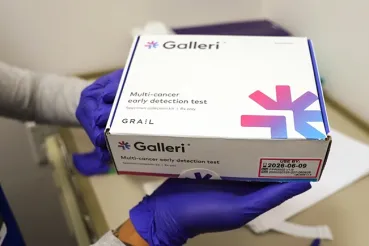Although inherited cancers are somewhat rare, approximately 5 to 10 percent of breast, ovarian and colon cancers are caused by hereditary factors. Fortunately, recent medical advances make it possible to turn this knowledge of family history into preventive measures.
This approach has a high-profile champion in actress/director Angelina Jolie Pitt, who has chronicled her experiences with genetic testing and prophylactic surgery in opinion articles in the New York Times. Jolie disclosed in May 2013 that she had undergone a preventive double mastectomy. She wrote a second article published in March 2015 discussing her decision to undergo surgical removal of her ovaries and fallopian tubes.
Jolie said she carries the BRCA1 gene, a genetic mutation that significantly increases a woman's risk of developing breast and ovarian cancer. Her own mother died of ovarian cancer at the age of 56, and Jolie's doctors estimated that she had an 87 percent risk of developing breast cancer and a 50 percent risk of developing ovarian cancer during her lifetime. Rather than take her chances, Jolie took action.
"It is not easy to make these decisions,"she wrote in her second essay. "But it is possible to take control and tackle head-on any health issue. You can seek advice, learn about the options and make choices that are right for you. Knowledge is power."
Genetic counseling
To help people with a strong family history determine their risk for developing cancer, the Rush Inherited Susceptibility to Cancer (RISC) Clinic and the Sandra Rosenberg Registry for Hereditary and Familial Colon Cancer offer genetic testing and counseling for certain inherited cancers.
Getting genetic testing for cancer allows people the ability to be proactive and address a problem before it develops, rather than be reactive when they develop cancer. If you can detect cancer earlier, you can do more to control or beat it.
Know your risks
The most common cancers with a genetic component include breast cancer, ovarian cancer, endometrial cancer and colon cancer.
Colorectal cancer: At the high end of risk, about 25 percent of patients with colorectal cancer have a family history of the disease.
According to the National Cancer Institute, current estimates are that gene mutations that are inherited account for about five to six percent of colon cancer cases. Inherited colorectal cancer includes familial adenomatous polyposis (FAP) and hereditary nonpolyposis colon cancer (HNPCC).
Breast or ovarian cancer: If people have genetic mutations, including the BRCA1 and BRCA2 mutations, their families share the risk:
- First-degree relatives (parents, siblings, children) have a 50 percent chance of having the same mutation.
- Second-degree relatives (grandparents, grandchildren, aunts, uncles, nieces, nephews) have a 25 percent risk of having the same mutation.
- Third-degree relatives (first cousins, great grandparents, great grandchildren) have a 12.5 percent risk.
Should you get tested?
The American Society of Clinical Oncology recommends people consider genetic testing if their risk of having a genetic mutation is 10 percent or more.
"I usually try to test first-degree relatives of the known BRCA mutation carriers first because if first-degree relatives are negative for the mutation, then their offspring no longer have an increased risk of having the mutation," says Lydia Usha, MD, co-director of the RISC program.
"For example, if I tested a woman for BRCA mutations and she tested positive, I would test her sister before testing her niece," Usha adds. "If her sister tests negative for the mutation, then her niece (the daughter of the tested sister) would not need to be tested."
Getting genetic testing for cancer allows people the ability to be proactive and address a problem before it develops, rather than be reactive when they develop cancer.
Determining your personal risk
RISC program: The RISC program does the most work with people coming in for a breast cancer risk assessment. Recent studies have shown that, on average, women who test positive for BRCA1 or BRCA2 have up to 87 percent chance of developing breast and up to 50 percent chance of developing ovarian cancer by the time they are 70 years old.
However, the risk is different for each woman depending on a number of other factors including family history, personal health history and lifestyle.
Rosenberg registry: The registry focuses on determining risk and need for testing for colorectal cancer. People with FAP have an almost 100 percent chance of developing colorectal cancer before age 40; and people with HNPCC have an 80 percent chance of developing colorectal cancer in their lifetime, according to Joshua Melson, MD, MPH, medical director of the Rosenberg registry.
Benefits of genetic testing
Reducing your and your family's risks: One of the biggest benefits of genetic testing is that people who test positive for genetic mutations can be proactive in lowering their risk — as well as their family members' risks — of developing cancer.
Lifestyle modifications: Quitting smoking and increasing physical activity, among other lifestyle changes, can help decrease controllable risk factors. And increased monitoring and certain medications can make a significant impact on decreasing cancer risk.
Early detection of cancer: With any cancer, early detection is the key to survival. People who test positive for genetic mutations can benefit from increased surveillance strategies — such as mammograms, colonoscopies and breast MRIs — that allow for early detection of many cancers.
For instance, if found early, colorectal cancer has a 90 percent cure rate. The best defense against colorectal cancer is aggressive surveillance through regular colonscopies.
A colonoscopy can not only detect colorectal cancer early, but it can also help prevent colorectal cancer when physicians remove polyps during the colonoscopy before they turn into cancer. People who test positive for genetic mutations involved in colorectal cancer, along with other high-risk individuals, can put together a screening plan depending on their specific risk factors.
HNPCC (also known as Lynch syndrome) also increases women's risk of developing uterine cancer and ovarian cancer. Women at risk for or identified with Lynch syndrome undergo surveillance with vaginal ultrasound and other procedures to reduce their risk of developing gynecologic cancer.
Preventive measures
Chemoprevention: Some women who are at risk for developing breast or ovarian cancer can fight back with chemoprevention, oral medications that can significantly reduce a person's risk of developing breast and ovarian cancers.
Chemoprevention medications include three antihormonal medications that have been shown to decrease the risk of breast cancer in women at increased risk by 38 to 65 percent, according to Usha. This therapy is available both to women who have a strong family history but no genetic mutations and those with the BRCA mutations in certain cases.
"It is a little bit controversial for women with the BRCA mutations because the risk of breast cancer may be so high in these women that the medication may not be effective," says Usha. "In those cases, we would not recommend chemoprevention and we would discuss prophylactic surgery, such as bilateral (or double) mastectomy or oophorectomy (removal of the ovaries)."
Surgery: Although surgery is the most invasive and life-changing option, it is also the most effective for preventing cancer. "If there is an organ with a high risk and the patient is at a stage in his or her life where that organ can be removed, we may recommend that option," says Usha.
"For instance, if a woman is at risk for ovarian cancer and she has completed childbearing, we discuss removal of the ovaries. Ovarian cancer is much more deadly than breast cancer, but removing the ovaries would almost eliminate her risk for ovarian cancer. It also would decrease her risk of breast cancer by 50 percent if the woman is under the age of 40 or 50."
Ongoing research is currently studying the emerging role for chemoprevention in colorectal cancer patients with HNPCC or FAP. However, with inherited colon cancer, surgery to remove the colon is often the only option for eliminating risk.
Patients are closely monitored with screening strategies. If something is found, such as a cancerous tumor or polyp, the patient can then undergo surgery to remove the colon.
People opting for prophylactic surgery because of their genetic mutations undergo extensive education and counseling to discuss their decision and recognize the impact it will have on their lives.
Emotional hurdles
Making the decision to get tested for cancer-causing mutations is highly personal. There are a number of emotional factors at play. After testing positive for a genetic mutation, people may face a number of personal challenges and doubts — and there are significant implications for their entire family.
"Primarily, people choose to get tested for their children or for the rest of their family," says Usha. "Particularly if a person has advanced cancer, they understand that while they may not benefit from the testing, it can make a big difference for their family."
Expertly trained psychologists (available through the RISC program and the registry) can help people deal with the emotional aspects of genetic testing; offer support to their affected family members; and guide patients and families through the process.
This kind of support can also help people make informed decisions on how they want to move forward.
"Undergoing genetic testing is both a clinical and personal decision for people," says Usha. "Some people are afraid and don't want to know that they may have a predisposition to cancer. But to me, knowledge is power. If you know you have a predisposition to cancer, you can work to prevent it."




